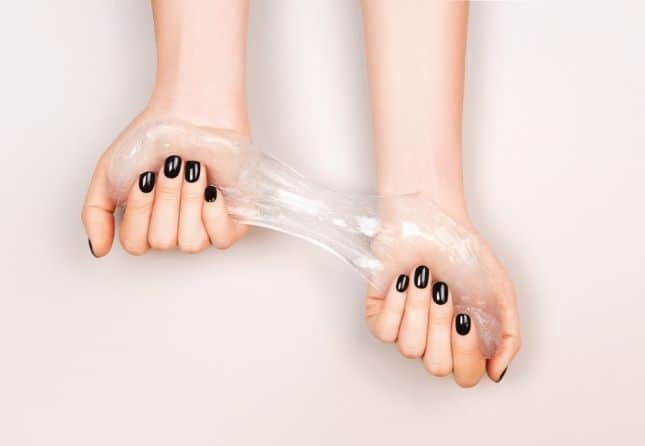
Ah, Estrogen… A crucial hormone that can bring so much joy. And sooo much discomfort.
Anyone who has or has ever had periods will happily tell you just how uncomfortable estrogen can make your life, from heavy periods to sore boobs and many, many things in between.
But, there’s another way estrogen can be a pain in the you-know-what and it happens during excretion. Yup, today we’re talking about peeing. Well, sort of. Because, and we did not know this before, estrogen doesn’t always leave your body when the ovulation party is over. And that can lead to increased anxiety and even worse PMS.
What, exactly, does that have to do with peeing? Well, first and foremost, peeing is one of your body’s waste disposal systems. Many of the leftovers from bodily processes are easily broken down by your liver and kidneys, and you trash them when you pee.
Estrogen, though, is tricksy. In order for it to safely leave your body, your liver has to do some pretty fancy footwork. But, that doesn’t always go quite the way it should.
Wouldn’t you know it, some of us have a much harder time getting estrogen to leave than others. And that means that we’re not peeing out as much of the stuff as we should be. Left to run amok, estrogen waste can build up, leading to horrendous periods, fibroids, and the worst PMS you’ve ever seen. So, that’s the bad news.
Here’s the good news: There are some really simple things you can do before and during ovulation to help your liver boot out that unwanted estrogen waste.
Here’s the even better news: They’re all food! No, you read that right. The best way to help your liver is to eat some delicious stuff.
Let’s start with the fantastically named Cruciferous veggies. To you and me, that’s things like broccoli, cauliflower, kale, and arugula. To these leafy beauties, add some beets, garlic, and onions. Then there’s turmeric, flaxseed, salmon, and fresh fruit. Did we tell you it was yummy? Lean meat and nuts can also help you metabolize and trash those estrogen stragglers.
Then there’s the vitamins and minerals you could add, in a supplement most likely, to make sure you’re getting all the nutrients you need. Make sure it includes zinc, folic acid, and vitamins D, E, and B12. At which point, your liver will very much start thanking you. And while it’s thanking you, make sure you’re getting plenty of water, and maybe a little exercise. Admittedly, this all sounds very much like eating healthily, and it is. But adding these specific fruits, veggies, and vitamins to your diet could help tame that unwanted estrogen waste. And you just might feel better in the bargain.
Disclaimer: This website does not provide medical advice
The information, including but not limited to, text, graphics, images and other material contained on this website are for informational purposes only. No material on this site is intended to be a substitute for professional medical advice, diagnosis or treatment. Always seek the advice of your physician or other qualified health care provider with any questions you may have regarding a medical condition or treatment and before undertaking a new health care regimen, and never disregard professional medical advice or delay in seeking it because of something you have read on this website.

-


Dr Singh is the Medical Director of the Indiana Sleep Center. His research and clinical practice focuses on the myriad of sleep.

What vaginal discharge colors mean for your health Understanding vaginal discharge colors and meaning is essential for every woman at every stage of life. While some colored discharge may indicate infections, others are normal. White and clear The first discharge

Understanding perimenopause and menopause When talking about perimenopause versus menopause, it’s easy to confuse these two stages. Perimenopause is the transitional period when you move away from your peak fertility and your ovaries gradually stop releasing eggs. In turn, menstruation

Understanding perimenopause and its symptoms When it comes to aging, many women know about menopause but are surprised to learn about the transitional stage leading up to it, called perimenopause. There are three stages of perimenopause: early, late, and menopause,
| Cookie | Duration | Description |
|---|---|---|
| cookielawinfo-checkbox-analytics | 11 months | This cookie is set by GDPR Cookie Consent plugin. The cookie is used to store the user consent for the cookies in the category "Analytics". |
| cookielawinfo-checkbox-functional | 11 months | The cookie is set by GDPR cookie consent to record the user consent for the cookies in the category "Functional". |
| cookielawinfo-checkbox-necessary | 11 months | This cookie is set by GDPR Cookie Consent plugin. The cookies is used to store the user consent for the cookies in the category "Necessary". |
| cookielawinfo-checkbox-others | 11 months | This cookie is set by GDPR Cookie Consent plugin. The cookie is used to store the user consent for the cookies in the category "Other. |
| cookielawinfo-checkbox-performance | 11 months | This cookie is set by GDPR Cookie Consent plugin. The cookie is used to store the user consent for the cookies in the category "Performance". |
| viewed_cookie_policy | 11 months | The cookie is set by the GDPR Cookie Consent plugin and is used to store whether or not user has consented to the use of cookies. It does not store any personal data. |
